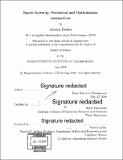| dc.contributor.advisor | Rahul Mazumder. | en_US |
| dc.contributor.author | Dedieu, Antoine | en_US |
| dc.contributor.other | Massachusetts Institute of Technology. Operations Research Center. | en_US |
| dc.date.accessioned | 2018-11-28T15:44:33Z | |
| dc.date.available | 2018-11-28T15:44:33Z | |
| dc.date.copyright | 2018 | en_US |
| dc.date.issued | 2018 | en_US |
| dc.identifier.uri | http://hdl.handle.net/1721.1/119354 | |
| dc.description | Thesis: S.M., Massachusetts Institute of Technology, Sloan School of Management, Operations Research Center, 2018. | en_US |
| dc.description | Cataloged from PDF version of thesis. | en_US |
| dc.description | Includes bibliographical references (pages 101-109). | en_US |
| dc.description.abstract | In this thesis, we study the computational and statistical aspects of several sparse models when the number of samples and/or features is large. We propose new statistical estimators and build new computational algorithms - borrowing tools and techniques from areas of convex and discrete optimization. First, we explore an Lq-regularized version of the Best Subset selection procedure which mitigates the poor statistical performance of the best-subsets estimator in the low SNR regimes. The statistical and empirical properties of the estimator are explored, especially when compared to best-subsets selection, Lasso and Ridge. Second, we propose new computational algorithms for a family of penalized linear Support Vector Machine (SVM) problem with a hinge loss function and sparsity-inducing regularizations. Our methods bring together techniques from Column (and Constraint) Generation and modern First Order methods for non-smooth convex optimization. These two components complement each others' strengths, leading to improvements of 2 orders of magnitude when compared to commercial LP solvers. Third, we present a novel framework inspired by Hierarchical Bayesian modeling to predict user session-length on on-line streaming services. The time spent by a user on a platform depends upon user-specific latent variables which are learned via hierarchical shrinkage. Our framework incorporates flexible parametric/nonparametric models on the covariates and outperforms state-of- the-art estimators in terms of efficiency and predictive performance on real world datasets from the internet radio company Pandora Media Inc. | en_US |
| dc.description.statementofresponsibility | by Antoine Dedieu. | en_US |
| dc.format.extent | 121 pages | en_US |
| dc.language.iso | eng | en_US |
| dc.publisher | Massachusetts Institute of Technology | en_US |
| dc.rights | MIT theses are protected by copyright. They may be viewed, downloaded, or printed from this source but further reproduction or distribution in any format is prohibited without written permission. | en_US |
| dc.rights.uri | http://dspace.mit.edu/handle/1721.1/7582 | en_US |
| dc.subject | Operations Research Center. | en_US |
| dc.title | Sparse learning : statistical and optimization perspectives | en_US |
| dc.type | Thesis | en_US |
| dc.description.degree | S.M. | en_US |
| dc.contributor.department | Massachusetts Institute of Technology. Operations Research Center | |
| dc.contributor.department | Sloan School of Management | |
| dc.identifier.oclc | 1065541961 | en_US |
